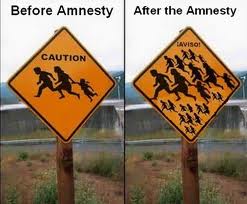That Donald Trump has said something incoherent is not remarkable. But even for a campaign that has largely substituted adjectives for ideas, Trump’s recent incoherent comments on immigration were remarkable, coming as they do from a candidate who has made immigration the keystone of his platform. His intellectual failure is instructive, and the other candidates should learn from it.

Asked about his immigration ideas on CNN, Trump was a mess, beginning with the old “jobs Americans won’t do” canard favored by open-borders proponents (a canard because it always leaves out the relevant qualifier: “at current wages”), then suggesting that we should deport the millions of illegals who are already here only to turn around and bring them back (“I want to move them out, and we’re going to move them back in, and let them be legal”). This process would include those brought here as young children, who will be deported and recycled based on the criterion of whether they are — Trump’s word — “terrific.” What might constitute a federal terrificness standard remains unclear. “We’re going to do something,” Trump said. “I’ve been giving it so much thought. You know you have a, on a humanitarian basis, you have a lot of deep thought going into this, believe me. I actually have a big heart.”
This issue, like so many others, requires less heart-power and more brain-power.
Deporting some 11 million illegals who have for many years evaded deportation only to reimport them under an expedited legal immigration system, the contours of which currently are undefined, and then granting them some sort of permanent legal status is simply another variation on amnesty, and a complicated, expensive, and thick-headed version of amnesty at that. Like the proposed reform program of 2007, which would have purportedly required illegals to be present in their country of origin when applying for legal status, this isn’t just amnesty — it’s also amnesty-laundering.
“Do something,” Trump says, and the perceived immediate need to do something — something — about immigration is what drives politicians toward amnesty and “comprehensive” reform schemes. And there is a need to do something immediately, but it is not what Trump or most other political candidates seem to think.
There is, in fact, no pressing immediate need to either deport the 11 million illegals, including those brought here as young children, or to normalize their status. Many of them have been here for decades, and while this situation is deeply undesirable, it is no more undesirable today than it was five years ago. Deciding what to do about the illegal population already resident in the United States is important, but it is of secondary importance.
The first item on any intelligent immigration-reform agenda is: Secure the borders of the United States and start enforcing our immigration laws.
The first item on any intelligent immigration-reform agenda is: Secure the borders of the United States and start enforcing our immigration laws. Not only is that the first item on the agenda, until it is done it should be the only item on the agenda, since in the absence of secure borders and robust immigration controls any conceivable proposal to resolve the status of the illegals already here would simply provide another incentive for additional illegal immigration. That is not workable as a practical matter or as a political matter.
Republicans have made the politics of this more difficult than they need to be. A plurality of Americans supports reducing our current levels of immigration, legal and illegal; only a tiny minority wants higher levels of immigration; enforcement is very popular, including among the Hispanic voters that Republicans believe themselves to be courting with indulgent attitudes toward illegals. National security, economics, prudence, and the poll numbers are all united on the right side of the issue, but Republicans aren’t.









